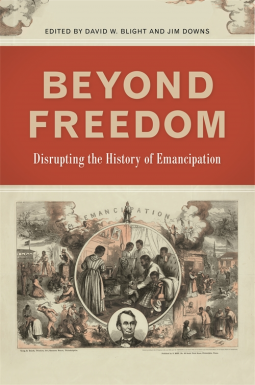
Beyond Freedom
Disrupting the History of Emancipation
by
This title was previously available on NetGalley and is now archived.
Send NetGalley books directly to your Kindle or Kindle app
1
To read on a Kindle or Kindle app, please add kindle@netgalley.com as an approved email address to receive files in your Amazon account. Click here for step-by-step instructions.
2
Also find your Kindle email address within your Amazon account, and enter it here.
Pub Date Nov 01 2017 | Archive Date Nov 08 2017
Description
This collection of eleven original essays interrogates the concept of freedom and recenters our understanding of the process of emancipation. Who defined freedom, and what did freedom mean to nineteenth-century African Americans, both during and after slavery? Did freedom just mean the absence of constraint and a widening of personal choice, or did it extend to the ballot box, to education, to equality of opportunity? In examining such questions, rather than defining every aspect of postemancipation life as a new form of freedom, these essays develop the work of scholars who are looking at how belonging to an empowered government or community defines the outcome of emancipation.
Some essays in this collection disrupt the traditional story and time-frame of emancipation. Others offer trenchant renderings of emancipation, with new interpretations of the language and politics of democracy. Still others sidestep academic conventions to speak personally about the politics of emancipation historiography, reconsidering how historians have used source material for understanding subjects such as violence and the suffering of refugee women and children. Together the essays show that the question of freedom—its contested meanings, its social relations, and its beneficiaries—remains central to understanding the complex historical process known as emancipation.
Contributors: Justin Behrend, Gregory P. Downs, Jim Downs, Carole Emberton, Eric Foner, Thavolia Glymph, Chandra Manning, Kate Masur, Richard Newman, James Oakes, Susan O’Donovan, Hannah Rosen, Brenda E. Stevenson.
A Note From the Publisher
Part of the UnCivil Wars series.
Available Editions
| EDITION | Other Format |
| ISBN | 9780820351490 |
| PRICE | $24.95 (USD) |
| PAGES | 208 |
Links
Average rating from 1 member
Featured Reviews
 Stacie C, Reviewer
Stacie C, Reviewer
Beyond Freedom: Disrupting the History of Emancipation edited by David W. Blight and Jim Downs
Well this was a profound and interesting series of essays that look beyond what we know as the concept of freedom after emancipation for enslaved people. Each essay takes a different look at how history concerning the Civil War and the Reconstruction era discusses what freedom actually means and how the horror of slavery defines freedom. These essays cover an array of topics regarding emancipation and the war such as the experience of Black women and children during that time, sexual violence, and culture. It begs the question of what freedom actually means, what it looks like to those that were in bondage and how the reality differed from what the North believed was happening and what Southerners allowed to happen after emancipation. But what I found most interesting about all of these essays are the ways the writers described in depth the way the studies have been conducted in the past and how a different take on the narrative would add more depth and understanding to the experience of newly freed people.
The most shocking essay for me and the one that really stood out upon completing this book was the essay regarding Black women and children. There are some horrors you simply can’t imagine and to see them laid so bare on the page really made me emotional. In this essay the author, Thavolia Glymph, also discussed refugees and refugee centers that were mostly Black women and children during the war. I don’t know if I’ve ever seen discussions regarding refugees during the Civil War so to read about their experiences and the horror that ensued was enlightening but also extremely disheartening.
I would definitely recommend this book. I think each essay brings up very valid points about how the history of Civil War and Reconstruction has been told and the ways in which it can improve. These essays disparage the revisionist attitude that some take regarding the cause of the Civil War and also dismantles the object racism in some of the research that shows Black enslaved people as inferior. Concise, in-depth, well researched and full of information this series of essay does a great job at presenting the ways in which research should expand in regards to emancipation.



